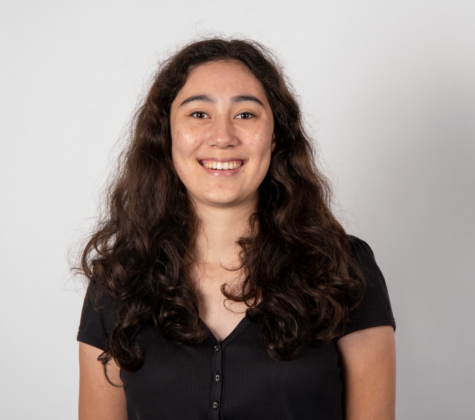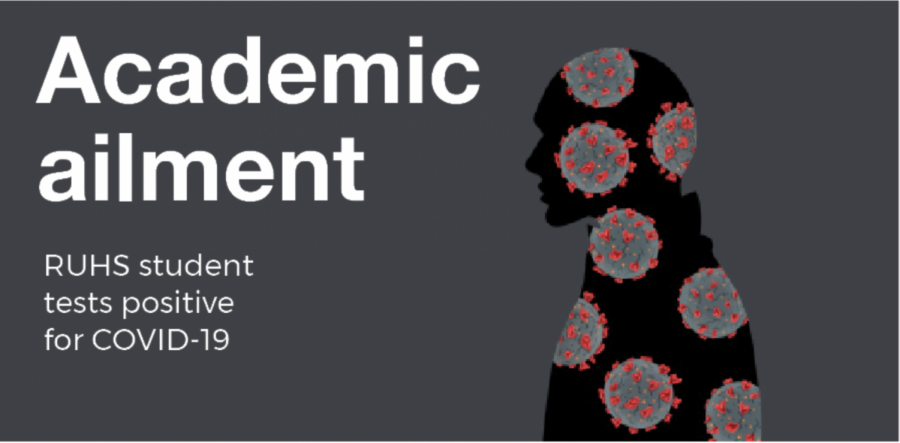Academic Ailment
RUHS Student tested positive for COVID-19
The RUHS student had a “bad cough” and a runny nose for the first two or three days, and for the next four days they “felt perfectly fine.” Then the next week, they lost their sense of taste and smell.
The student contracted coronavirus after going to visit a few relatives where one family member who had COVID-19 was standing ten feet away.
“He was wearing a mask and I was wearing a mask, but I guess that wasn’t enough to protect us from it,” they said.
Two days after that interaction, they were tested after noticing symptoms for influenza. The student took an influenza test as well as a COVID test; they tested negative for the influenza, but positive for COVID-19.
“I actually laughed. When the doctor came back and said, ‘You have COVID.’ I sat down and said, ‘Ha, that’s funny.’ I didn’t get really scared. I just said, ‘Okay well I got COVID,’ and I made a few jokes here and there. But I took it seriously when I needed to quarantine and be put in my room for two weeks or more,” they said.
While doing everything they could to take care of themself, during the quarantine period, the student still relied on support from their family.
“I had my mom. She was there and made sure that I got things I needed. If I was hungry, she brought food to the door and left it outside. Whatever dishes need to be taken out, I’d set them by the doors, and she’d come and take them out,” they said.
In the quarantine, measures were set for the safety of others in the household and rules were established for exiting the room or doing daily tasks.
“For example, if I needed to use the bathroom or take a shower, I’d have to let people know around the house that I’m about to leave my room. They then have to take everything that they have in the bathroom, like towels and toiletries, and put them somewhere else. I wear my mask when I leave my room, and then I can go in, so it’s a process,” they said.
The student also understood that the impacts of getting sick extended far beyond the surface.
“When I got sick, it put my family on hold. My mom can’t go to work anymore. I’m stuck inside and it’s hard to do schoolwork because I’m sick and I’m mentally trying to fight the virus and be happy all the time. My brothers and sisters can’t do stuff that they would normally be able to do because I got sick,” they said.
Along with the physical symptoms, the student also describes mental challenges they faced in isolation and distance learning.
“You’re not fully there, you’re not fully healthy, and then you gotta do schoolwork and focus. It’s a mental block that you got to get past,” they said.
Although the student has minimal concern for their own health being greatly affected by the virus, they realized that their focus needed to be placed elsewhere.
“I’m not scared of what it can do to me. I’m scared of what it could do for other people. I know that there are people out there that can get severely sick, like grandparents or even parents. If you do pass the virus to them, it could cause damage to them. That’s the big concern,” they said.
The student says the biggest misconception they have heard is, “I’ll be perfectly fine if I get it because I’m young and healthy.” They cited a case of a 17 year old who contracted COVID-19 and passed away because he didn’t receive the right treatments due to a misdiagnosis.
“I feel both lucky and kind of special. Special in a certain way because I survived a possibly deadly disease. I’m one of the lucky people that didn’t get it worse than others,” they said.
They also stressed their concerns about the political scene and interpretation of the virus by the media.
“When I got COVID, I realized that these people don’t even see it as others actually getting sick and struggling to make ends meet, they just fight over it politically. I’m considered a number,” they said. “It’s crazy to see that we live in America now where people don’t care about their neighbors or their fellow Americans.”
The student strongly believes that going outside without a mask is an act of ignorance.
“By going out and displaying that you think you know more than doctors, or people who have studied viruses and diseases for years and have made it their life’s work, shows that you genuinely don’t care about the American people,” they said. “I don’t think that people should be taking this with a grain of salt.”

Hi! My name is Emilie, this is my fourth year on staff and did you know that green onions are super easy to grow in your backyard? Because I didn't know until I told my friend how excited I was about growing...



